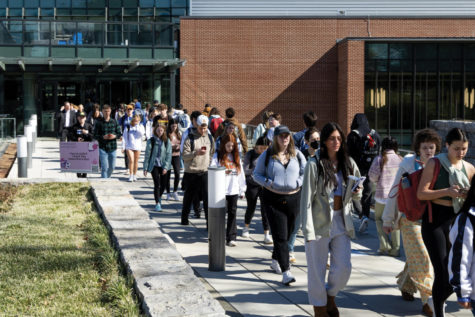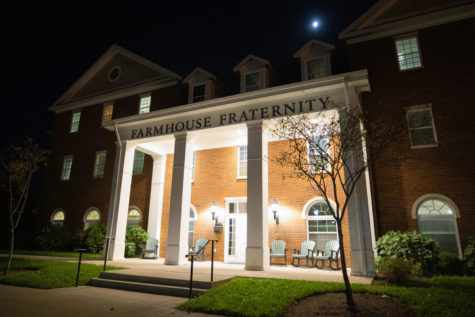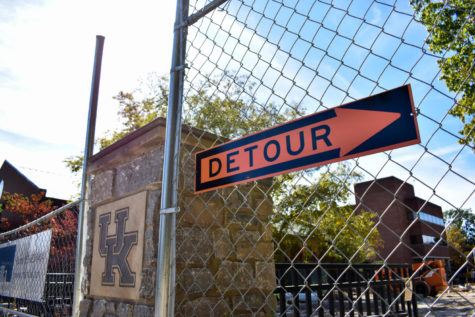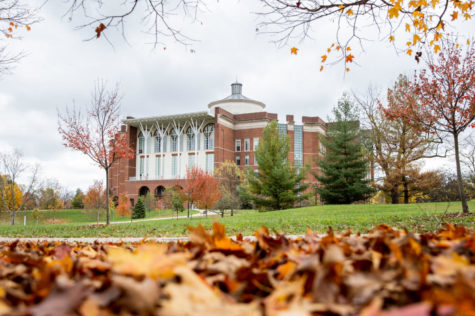So, you want to vote early?
October 13, 2020
Everything you need to know before you hit the polls
So, you procrastinated too long and didn’t order a mail-in ballot by the deadline. It’s okay, I’m right there with you. Fortunately, you still have an option to both vote and stay COVID-safe by utilizing early in-person voting.
The polls opened Tuesday and will stay open for three weeks. But why wait until Election Day, with long lines full of frustrated voters? The early voting process is easy If you have the right information before you vote. Here’s what you should know, from my research and experience early voting:
How does early voting work, anyways?
If you’ve ever voted in-person on past election days, early voting is largely the same—sans the long line, perhaps. I voted at Northside Branch Library on Oct. 13. I walked into the building, handed my ID to a volunteer poll worker to scan, signed my name on an iPad to verify my identity and filled out the voting ballot, not unlike how I would fill out a standardized test answer sheet, in one of a handful of private voting booths. After making all my selections, I inserted my completed ballot into a machine that verified it and signaled that I had successfully voted on a computer screen. And that was it. Simple and quick. The only thing missing was an “I Voted” sticker to show off on social media and on campus.
Where and when can I vote?
From Oct. 13 to Nov. 2, early voters can vote at any of the following locations, no matter where they live:
- · Tates Creek Branch Library, 3628 Walden Dr.
- · Northside Branch Library, 1733 Russell Cave Road
- · Beaumont Branch Library, 3080 Fieldstone Way
- · Dunbar Center, 545 N. Upper St.
- · Lexington Senior Center, 195 Life Lane (behind Southland Christian Church on Richmond Road)
- · BCTC Leestown Campus, 164 Opportunity Way
- · Wellington Elementary, 3280 Keithshire Way
- · Garrett Morgan Elementary, 1150 Passage Mound Way
Polls are open 8:30 a.m. to 4 p.m. Monday through Friday and 9 a.m. to 1 p.m. on Saturdays.
Remember, it’s not just a presidential election
We all know the big race on the ballot: Trump vs. Biden. However, depending on where you live, there could be half a dozen more races on your ballot, including candidates vying for the Senate, House of Representatives, Lexington-Fayette Urban County Council and Fayette County Board of Education.
Figuring out which will appear on your individual ballot, however, might send you down a rabbit hole of confusing databases and articles. And, if you’re like 2019 me, you still might show up on Election Day and see races on your ballot you didn’t find in your pre-voting research. Thankfully, the Lexington Herald-Leader published a voter guide this year that can tell you exactly who—and what—to expect on your ballot just by entering the address you listed on your voter registration. Even better news, you don’t have to be a Herald-Leader subscriber to get full access to the resource (although, if you find it helpful, consider supporting the paper for more quality content).
There are proposed Kentucky constitutional amendments on the ballot, too
Don’t forget to complete both sides! Like many tests, the questions on the back side are just as important, if more easily forgotten. This year’s ballot features two amendments on the back.
According to Ballotpedia, in order for any amendment to be added to the Commonwealth’s Constitution, a majority of Kentucky voters have to approve it in a general election. This year, there are two amendments up for a vote: Marsy’s Law and an amendment extending term limits and legal requirements for some of the state’s judicial officials.
Marsy’s Law may sound familiar to 2018 Kentucky voters, 63% of which agreed it should be added to the state constitution. However, after its passing, the Kentucky Association for Criminal Defense Lawyers filed a lawsuit which ended up in the state Supreme Court, arguing that the one-sentence explanation provided to voters didn’t tell them enough about the amendment to make a fully-informed decision. The Supreme Court agreed, ruling that the amendment was void, pending approval in the 2020 general election, where it is accompanied by the full 600-word text of the amendment.
The second proposed amendment would extend term limits and require greater legal experience for Kentucky’s district judges effective 2022. Constitutional Amendment 2 would also allow commonwealth’s attorneys to serve eight-year terms instead of six starting in 2030. It is also paired with the full amendment text. I recommend reading both beforehand so you have time to fully understand what you are—or aren’t—agreeing to.
Okay, what about COVID=19?
While the polls are sure to be busy on Election Day, Nov. 3, you are less likely to encounter long lines if you opt to vote early. When I voted on Oct. 13 at Northside Branch Library around lunch time, I was one of only two voters there, which minimized my risk of COVID-19 exposure. I can’t speak for the other polling locations, but according to Lexington Herald-Leader article, the Dunbar Community Center had a line full of eager voters early in the day. Nevertheless, if you go a few hours after the polls open, before it gets close to Election Day, you likely won’t be putting yourself in as much risk.
As always, wear your mask, social distance when possible and bring some hand sanitizer to use before and after voting.
Who should I vote for?
Well, I can’t tell you that. But I can offer some free advice. First, do your research. After figuring out which races were on my ballot, it took me less than ten minutes the morning before voting to research the platforms of the candidates of which I wasn’t already familiar.
Second, don’t vote straight party unless your research leads you to candidates that all share the same party. Some of the more local offices might be more nuanced than Democrat vs. Republican, and the winners of those races will have a more direct and significant impact on your life than the national winners likely ever will. Not all local races are partisan, either.You’re not running for political office; you don’t have to fit into a single party’s “box” and you have permission to vote for candidates from multiple parties.
Third, don’t feel like you have to vote for a candidate in every race. If you don’t know anything about the candidates except their party, then why vote? You don’t actually know if their platform aligns with your beliefs or not, and it would be a shame to vote for someone who doesn’t actually represent. If you’re going to vote, be an informed voter. It’s for the good of our city, state and nation.
If I requested a mail-in ballot, can I still use early voting?
No. Please do not do this. It’s illegal, and if caught, you could get in major trouble for it.






















































































































































